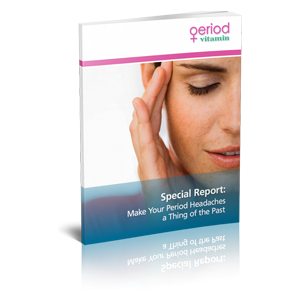To answer the question, Does magnesium help with menstrual migraines, you can go to the medical journal called Journal of Neural Transmission in May 2012. There Dr. A. Mauskop and Dr. Vanughese from the New York Headache Center speak what’s on their minds about magnesium for menstrual migraine.

Here are some of their major points about it:
- Migraine plays an important role in migraines, including menstrual migraines.
- Routine blood tests don’t tell you what your true level of magnesium is because 67% of magnesium is found in the bone and only 31% of it is found intracellularly.
- Magnesium deficiency causes depression, platelet aggregation, cramping and also affects serotonin receptor function. Low levels also cause the lack of production of different neurotransmitters in the brain.
It’s easy to end up with a magnesium deficiency, especially if any of these factors are present:
- Genetically, your cells aren’t absorbing magnesium.
- You may have a genetic kidney disorder that wastes magnesium in the body.
- Stress may be causing the excretion of excessive amounts of magnesium.
- You may have a deficiency.
It’s a known fact in science that people who suffer from migraines more often have a magnesium deficiency than those who are healthy. However, many doctors won’t believe this because of what they call “evidence-based medicine” where a study has to prove it to them. And since the studies are often not designed by nutritionists, the researchers make many mistakes that end up causing erroneous conclusions.
For example, the gold standard of medical studies is a double-blind, placebo-controlled trial. So the scientists will collect random people with headaches and put them in the trial, give them magnesium supplements and then see if it helps everyone or not. If it doesn’t help everyone, they say that magnesium doesn’t work.
This is like saying you want to do a study of water glasses in your home to see which of them will create a certain sound if you hit a fork on the glass. So you collect all the water glasses you can find in your house – and some of them have water in them already. What type of accurate results do you think you’re going to get?
You can’t have magnesium-deficient people and people without a magnesium deficiency in a study to see if magnesium helps those with migraines. People don’t become superhuman just because they get a supplement. Supplements only work when someone has a deficiency. Thus this “evidence-based medical study” is flawed.
 According to the researchers at the New York Headache Center, doctors could easily use intravenous magnesium, as it’s widely available, extremely safe, highly effective and very inexpensive when migraine sufferers have a magnesium deficiency. And since magnesium deficiency is present in 50% of all migraine sufferers, you would have a good chance of being deficient in this important nutrient – and could potentially benefit as well.
According to the researchers at the New York Headache Center, doctors could easily use intravenous magnesium, as it’s widely available, extremely safe, highly effective and very inexpensive when migraine sufferers have a magnesium deficiency. And since magnesium deficiency is present in 50% of all migraine sufferers, you would have a good chance of being deficient in this important nutrient – and could potentially benefit as well.
When magnesium is used as prophylaxis for menstrual migraine, it could easily have a positive effect on intracellular magnesium, raising it. You might even consider trying to prevent menstrual migraine by taking magnesium citrate, at a dosage of 300 mg twice daily.
Don’t forget also to take a period vitamin because you still need more vitamins and minerals than just magnesium. Vitamin and mineral deficiencies don’t come singly; if one is deficient, many more are, too. This gives us a clue that if you want to get over your migraines, taking the extra magnesium and the period vitamin is at least a good start for you to be impacting your vitamin and mineral levels. Try it and see what happens. As the doctors stated, it’s inexpensive and extremely safe.
Source: Mauskop, A. and Vanughese, J. Why all migraine patients should be treated with magnesium. J Neural Transm 2012 May; 119(5): 575-9.



